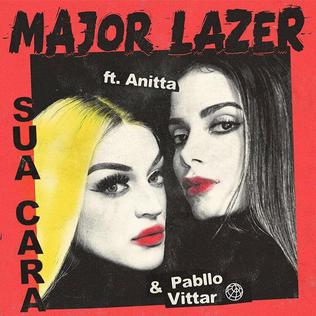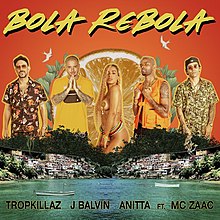This article needs additional citations for verification .(August 2008) |
| Funk melody | |
|---|---|
| Stylistic origins | |
| Cultural origins | 1990s, Rio de Janeiro, Brazil |
| Typical instruments | |
Funk melody is a fusion genre of funk carioca and Latin freestyle. [1]
This article needs additional citations for verification .(August 2008) |
| Funk melody | |
|---|---|
| Stylistic origins | |
| Cultural origins | 1990s, Rio de Janeiro, Brazil |
| Typical instruments | |
Funk melody is a fusion genre of funk carioca and Latin freestyle. [1]
DJ Marlboro's radio show "Big Mix", broadcast since the 80s, has popularised a soft version of the underground funk carioca songs. These soft versions formed a romantic subgenre called melodic funk in Brazil, adding melodies and arrangements to the raw, beat-y funk tunes.
Anitta is one of the most important artists of funk melody in Brazil. She helped popularize the genre throughout the country and brought the musical style to other parts of the world, becoming one of the most internationally recognized Brazilian artists. Anitta was also one of the first funk melody artists to incorporate elements of other musical genres into her songs, such as pop, R&B, and hip hop, helping to modernize and evolve the musical style. Her music and urban lifestyle represent the cultural and musical movement of funk melody in Brazil, which is popular mainly among young people from impoverished communities. Her importance to funk melody is undeniable, having been one of the most influential and successful artists of the genre in recent decades. [2] [3]

Samba is a name or prefix used for several rhythmic variants, such as samba urbano carioca, samba de roda, amongst many other forms of samba, mostly originated in the Rio de Janeiro and Bahia states. Samba is a broad term for many of the rhythms that compose the better known Brazilian music genres that originated in the Afro-Brazilian communities of Bahia in the late 19th century and early 20th century, having continued its development on the communities of Rio de Janeiro in the early 20th century. Having its roots in Brazilian folk traditions, especially those linked to the primitive rural samba of the colonial and imperial periods, is considered one of the most important cultural phenomena in Brazil and one of the country symbols. Present in the Portuguese language at least since the 19th century, the word "samba" was originally used to designate a "popular dance". Over time, its meaning has been extended to a "batuque-like circle dance", a dance style, and also to a "music genre". This process of establishing itself as a musical genre began in the 1910s and it had its inaugural landmark in the song "Pelo Telefone", launched in 1917. Despite being identified by its creators, the public, and the Brazilian music industry as "samba", this pioneering style was much more connected from the rhythmic and instrumental point of view to maxixe than to samba itself.

The music of Brazil encompasses various regional musical styles influenced by European, American, African and Amerindian forms. Brazilian music developed some unique and original styles such as forró, axé, sertanejo, samba, bossa nova, MPB, gaucho music, pagode, tropicália, choro, maracatu, frevo, brega, modinha, capoeira, and Brazilian versions of foreign musical styles, such as rock, pop music, soul, hip-hop, disco music, country music, ambient, industrial and psychedelic music, rap, classical music, fado, and gospel.
Funk carioca, also known as favela funk, in other parts of the world as baile funk and Brazilian funk, or even simply funk, is a Brazilian hip hop-influenced music genre from Rio de Janeiro, taking influences from musical styles such as Miami bass and freestyle.
Música sertaneja or sertanejo is a music style that had its origins in the countryside of São Paulo in the 1920s. Its contemporary developments made it the most popular genre in the country, particularly throughout the southern, southeastern, and center-western interior. Subgenres include caipira, romântico, and universitário.
"Tico-Tico no fubá" is a Brazilian choro song written by Zequinha de Abreu in 1917. Its original title was "Tico-Tico no farelo", but since Brazilian guitarist Américo Jacomino "Canhoto" (1889–1928) had a work with the same title, Abreu's work was given its present name in 1931, and sometime afterward Aloysio de Oliveira wrote the original Portuguese lyrics.

Fernando Luiz Mattos da Matta, better known as DJ Marlboro, is a Brazilian DJ.

Larissa de Macedo Machado, known professionally as Anitta, is a Brazilian singer, songwriter, dancer, actress, and occasional television host. One of Brazil's most prominent artists, she became known for her versatile style and mixing genres such as pop, funk, reggaeton and electronic music. She has received numerous accolades, including four Latin American Music Awards, three MTV Music Video Awards, nine MTV Europe Music Awards, two Guinness World Records, and nominations for two Grammy Award and ten Latin Grammy Awards, in addition to being the Brazilian female singer with the most entries on the Billboard Hot 100. She has been referred to as the "Queen of Brazilian Pop".

Anitta is the debut studio album by Brazilian recording artist Anitta, released on July 3, 2013, by Warner Music Brasil. It was preceded by the single "Show das Poderosas," which was the biggest hit song in Brazil in 2013. The album sold over 40,000 copies in the first 10 days after its release. The album had four singles and earned Anitta a Prêmio Extra, two wins at the Brazilian Music Multishow Award in 2013 and a Latin Grammy Award nomination. To promote the album, she performed on the Rede Globo programs Esquenta!, Caldeirão do Huck, Encontro com Fátima Bernardes, Altas Horas, and Mais Você.

"Show das Poderosas" is a single by the Brazilian singer Anitta released on April 16, 2013. The song served as the lead single from her self-titled debut album (2013). The song has sold 50,000 paid downloads on Brazilian iTunes, and almost 85,000 worldwide. The song's music video has been viewed over 148 million times on YouTube.

Bang! is the third studio album by Brazilian singer Anitta, released on October 13, 2015, by Warner Music Brasil. The album contains 14 new songs plus an acoustic version of the single "Deixa Ele Sofrer".

"Sua Cara" is a song by American electronic dance music band Major Lazer from Know No Better (2017). The song features Brazilian singers Anitta and Pabllo Vittar. The song was recorded in February 2017, shortly after the Brazilian Carnival.

"Vai Malandra" is a song by Brazilian singer Anitta with fellow Brazilian singer Zaac and American rapper Maejor. The song features Brazilian producers Tropkillaz and DJ Yuri Martins. It was released as a single on December 18, 2017 and as the conclusion to Anitta's Check Mate project, where she releases a new song each month.

"Medicina" is a song recorded by Brazilian singer Anitta. It was released as a single on July 20, 2018, through Warner Music Brasil. The song was written by Anitta, Mauricio Montaner, Jon Leone, Mario Cáceres and Andy Clay.

"Bola Rebola" is a song by Brazilian production duo Tropkillaz, Colombian singer J Balvin, and Brazilian singer-songwriter Anitta featuring fellow Brazilian musician MC Zaac. Written alongside Hailey Leane Collier and Jazelle Paris Rodriguez, it was released as a single on 22 February 2019, through Universal Music. Featuring lines in Portuguese, English, and Spanish, the song has been classified by O Globo as a crossover of funk carioca with multiple genres.

Viviane de Queiroz Pereira, known professionally as Pocah and formerly MC Pocahontas, is a Brazilian singer-songwriter.

Versions of Me is the fifth studio album by Brazilian singer Anitta, released on April 12, 2022, through Warner Records and originally planned to be titled Girl from Rio. Anitta covered her various versions on the album, with Ryan Tedder serving as one of the executive producers for the album. Her second multilingual visual album after her fourth studio album, Kisses (2019), Versions of Me contains collaborations with Chencho Corleone, Ty Dolla Sign, Afro B, Khalid, Saweetie, YG, Papatinho, MC Kevin o Chris, Mr. Catra, Cardi B and Myke Towers, as well as Missy Elliott, Maluma, L7nnon, Maffio, ASAP Ferg, Harv, Pedro Sampaio, Dadju, Nicky Jam and MC Pedrinho.

Funk Generation is the sixth studio album by Brazilian singer Anitta. It was released on 26 April 2024, through Floresta Records, Republic Records and Universal Latin Entertainment. The album features guest appearances from Brray, Bad Gyal, Dennis, Pedro Sampaio and Sam Smith. It is her third trilingual album after Kisses (2019) and Versions of Me (2022).

The Ensaios da Anitta are a series of live shows performed by singer Anitta, aimed at celebrating the pre-Carnival season in Brazil. Launched in January 2019, these events take place annually in January and February, traveling through various Brazilian cities such as Rio de Janeiro, São Paulo, Salvador, and Belo Horizonte. These shows were conceived by Anitta as a way to energize her audience for her Carnival street party, the "Bloco da Anitta", offering a mix of live music, dance, and themed performances.
The Vanguard Trophy is a special honor presented within the framework of the Multishow Brazilian Music Award, created to recognize artists who have stood out for their innovation, impact, and lasting contributions to Brazilian music and culture. Launched in 2024, the trophy is part of the Multishow Award, which, since its inception in 1994, has established itself as Brazil's largest music award, highlighting the leading talents and productions of the Brazilian industry across various categories.